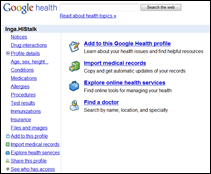The article about Pediatric Associates in CA has a nugget with a potentially outsized impact: the implication that VFC vaccines…
News 7/21/09
Half of all physician practices, medical billers, and billing offices are unable to estimate the amount due at the time of service. And, doctors collect only about half of the balance due from patients, with the balance going to bad debt. In other words, each year doctors are not collecting $14 to $30 billion of the money they are due. A few companies now offer tools to calculate the patient responsible portion at the time of service. As consumers pick up a bigger portion of their health care costs, look for increased adoption of these type technologies.
Google Health now supports document scanning, allowing patients to upload paper medical records. Google is also partnering with Caring Connections to allow users to download free advance directive forms.
Mednax pays cash for Mid-Tennessee Neonatology Associates, a 24-provider group serving NICUs in the Nashville area.
I happened upon this blog written by an ophthalmologist who also apparently runs a practice management and consulting firm. Dr. Peter Polack offers some sound advice on ways to ensure medical records remain legally sound, once doctors transition from paper charts to EMR. The key is ensuring EMRs are not altered, which requires automated audit features to track who accesses a patient record and when. I find it curious that Dr. Polack used the phrase “remain legally sound,” which somewhat suggests a paper chart cannot be altered. I’m pretty sure I’ve never seen an automated tracking system for paper charts, either.
Providers in Minnesota are now required by law to submit all insurance claims electronically, including those for private and governmental carriers. The state hopes to save about $60 million in administrative costs once all 60,000 providers have made the switch from paper. I’d actually like to see that math. I’m sure most larger clinics have already been submitting claims electronically for years. Is the $60 million a “real” number or just one that Minnesota legislators hope will impress their constituents?
EMR does not necessarily kill the use of pen and paper. So concludes a researcher from Roudebush VA Medical Center (IN). Clinicians often use sticky notes, index cards, and notebooks to improve workflow efficiency, as well as for memory aids. Don’t dump that Bic stock just yet.
A Phoenix-area OB/Gyn practice bans e-mail on Fridays to encourage more interpersonal communications. The 16-doctor, 130-employee group now have “Conversation Fridays” to promote more personal interaction among employees.
A Kaiser pediatrician shares his thoughts on EHR in an LA Times opinion piece. He admits that EHR doesn’t save time or money, though it does allow him to work remotely from home after the kids go to bed. He’s also enthusiastic about the efficiency of e-mail consults, which can reduce errors and boost care. He concludes, “Ultimately, getting away from a pen and paper is better for my patients.” Ahhh…so EHR isn’t just about stimulus money.
ENT and Allergy Associates (NY/NJ) announces they’ve expanded the use of their NextGen EMR system to 10 of its 30 practice sites. The practice includes about 90 physicians.
Fairfield County Community Health (OH) makes plans to purchase a PM/EMR solution after being awarded a $250,000 federal grant.
Parents claim that when their children’s care is coordinated through a medical home, their children have fewer hospitalizations and fewer school absences. Parents also worry less about their children’s health. The findings are based on a three-year New Hampshire survey that examined the effectiveness of using medical homes to coordinate pediatric care.
Disturbing: the Congressional Budget Office estimates that HR 3200 (America’s Affordable Health Choices Act 2009) would grow the deficit by a net $239 billion between 2010 and 2019.
The family of an elderly patient sues his dentist for allegedly dropping tools down the patient’s throat on two separate occasions. The suit claims the dentist dropped an implant screwdriver tool in 2006 and a mini-wrench in 2007. The 90-year patient had several medical procedures to remove the tools but never recovered.




Funny…I clicked on the link to the right, “Evan Steele on News 7/14/09”, and it went straight to the SRS website!
Bignurse: There’s two links there; Steele’s name (which leads to the SRS website) and a link back to one of his posts. This is nothing new on both HIStalk Practice and HIStalk.